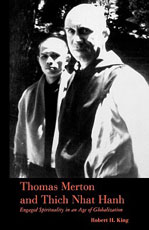Thomas Merton, the Catholic contemplative and social prophet, met Thich Nhat Hanh, the Vietnamese Buddhist peace activist on May 26, 1966, and the two men from different religious traditions realized they were kindred spirits. Both were convinced that their spiritual practices had relevance to the problems of the contemporary world. Both believed that what Thich Nhat Hanh would later call "engaged spirituality" meant combining contemplation and action. Their interreligious dialogue would prefigure later talks between Catholics and Buddhists — especially the Gethsemane Encounter.
Robert H. King, a recently retired professor of philosophy and religion, sees in Merton and Thich Nhat Hanh "a new kind of spirituality that I believe may be the best hope for religious renewal in our day." With great enthusiasm, the author summarizes the unique aspects of their writings with special emphasis upon Merton's love of contemplation and Thich Nhat Hanh's focus upon mindfulness, the practice of being totally present in the here and now.
The forerunner to their inspiring brand of engaged spirituality was Mahatma Gandhi whose social activism and nonviolence grew naturally out of his devotional life of mantra, silence, and retreat. As King points out, the nonviolence of these three spiritual practitioners was founded on their faith in the underlying unity of all beings. We affirm the author's salute to Merton and Thich Nhat Hanh as global heroes who have bequeathed to us the lineaments of a slowly burgeoning engaged spirituality and interfaith dialogue movement.
